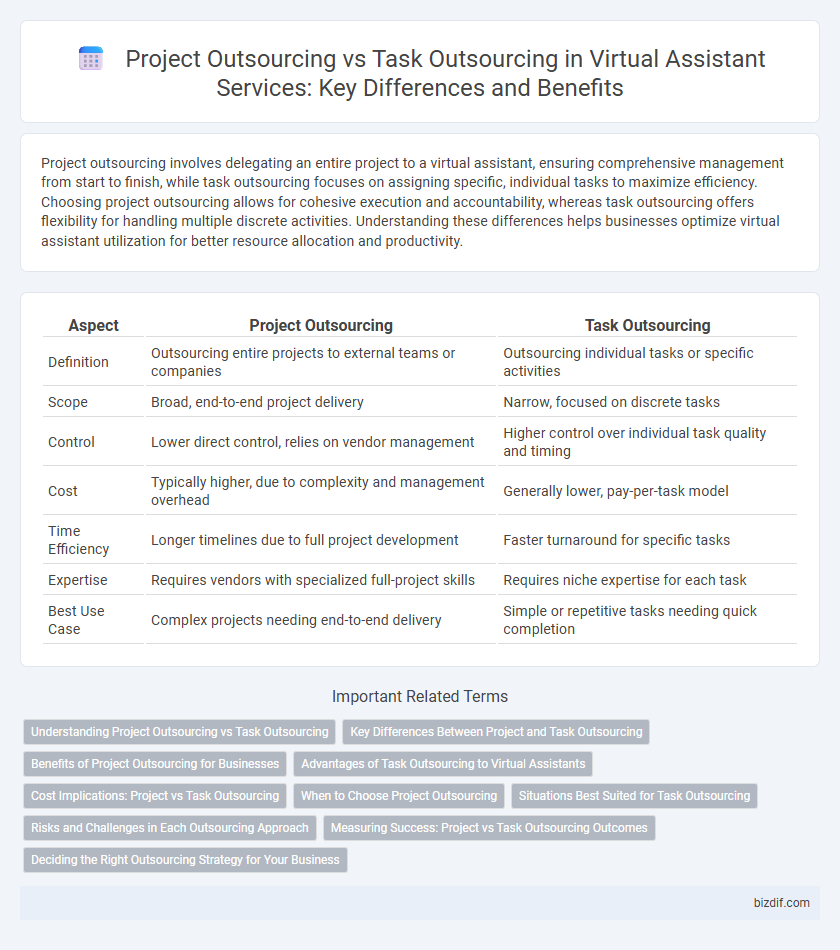Project outsourcing involves delegating an entire project to a virtual assistant, ensuring comprehensive management from start to finish, while task outsourcing focuses on assigning specific, individual tasks to maximize efficiency. Choosing project outsourcing allows for cohesive execution and accountability, whereas task outsourcing offers flexibility for handling multiple discrete activities. Understanding these differences helps businesses optimize virtual assistant utilization for better resource allocation and productivity.
Table of Comparison
| Aspect | Project Outsourcing | Task Outsourcing |
|---|---|---|
| Definition | Outsourcing entire projects to external teams or companies | Outsourcing individual tasks or specific activities |
| Scope | Broad, end-to-end project delivery | Narrow, focused on discrete tasks |
| Control | Lower direct control, relies on vendor management | Higher control over individual task quality and timing |
| Cost | Typically higher, due to complexity and management overhead | Generally lower, pay-per-task model |
| Time Efficiency | Longer timelines due to full project development | Faster turnaround for specific tasks |
| Expertise | Requires vendors with specialized full-project skills | Requires niche expertise for each task |
| Best Use Case | Complex projects needing end-to-end delivery | Simple or repetitive tasks needing quick completion |
Understanding Project Outsourcing vs Task Outsourcing
Project outsourcing involves delegating entire, complex assignments with defined objectives and deliverables to external teams, requiring strategic oversight and long-term collaboration. Task outsourcing focuses on specific, individual activities or repetitive tasks that can be completed independently, allowing for quicker turnaround and reduced management effort. Understanding the distinction enables businesses to optimize resource allocation, improve efficiency, and tailor outsourcing strategies to meet operational goals effectively.
Key Differences Between Project and Task Outsourcing
Project outsourcing involves delegating an entire project with defined objectives and timelines to an external team, ensuring comprehensive management and delivery. Task outsourcing focuses on assigning specific, individual tasks or activities within a project to specialized freelancers or virtual assistants for efficiency. Key differences include scope, control level, and accountability, with project outsourcing demanding broader oversight and task outsourcing allowing for focused expertise on discrete functions.
Benefits of Project Outsourcing for Businesses
Project outsourcing allows businesses to delegate entire projects to specialized virtual assistants, ensuring streamlined workflows and expert handling from start to finish. This approach enhances efficiency, reduces management overhead, and delivers cohesive results aligned with strategic goals. By leveraging expert virtual assistant teams, companies gain access to diverse skills and innovative solutions without the costs and commitments of full-time hires.
Advantages of Task Outsourcing to Virtual Assistants
Task outsourcing to virtual assistants offers increased flexibility by allowing businesses to delegate specific tasks without committing to long-term contracts. It enhances cost-efficiency by reducing the need for full-time salaries and benefits, while enabling access to specialized skills tailored to individual project requirements. This approach streamlines workflow management and improves productivity by freeing in-house teams to focus on core business functions.
Cost Implications: Project vs Task Outsourcing
Project outsourcing involves higher upfront costs due to comprehensive scope and long-term commitment, often requiring detailed planning and coordination. Task outsourcing offers more flexibility with cost-efficiency by paying only for specific, often smaller, deliverables, reducing ongoing expenses and minimizing financial risk. Companies aiming to optimize budgets must evaluate the complexity and duration of work to balance the cost benefits between full project outsourcing and task-based outsourcing.
When to Choose Project Outsourcing
Project outsourcing is ideal when businesses require comprehensive solutions that involve multiple interconnected tasks, ensuring consistency and quality throughout the project lifecycle. It is suited for complex initiatives needing specialized skills, dedicated resources, and clear deadlines managed by a single provider. Choosing project outsourcing enhances efficiency, reduces management overhead, and delivers cohesive outcomes compared to fragmented task outsourcing.
Situations Best Suited for Task Outsourcing
Task outsourcing is ideal for businesses needing specific, repetitive tasks completed efficiently without long-term commitment, such as data entry, social media management, or email filtering. It suits organizations aiming to optimize operational costs by delegating discrete assignments to virtual assistants with specialized skills. This approach often benefits startups and small enterprises requiring flexible support during peak workloads or seasonal demands.
Risks and Challenges in Each Outsourcing Approach
Project outsourcing involves delegating an entire project to an external team, posing risks such as misaligned objectives, reduced control over workflows, and potential communication barriers that can delay delivery. Task outsourcing, focusing on specific, discrete tasks, risks include inconsistent quality, lack of integration with broader project goals, and challenges in managing multiple vendors simultaneously. Both approaches require rigorous vetting, clear contractual agreements, and robust project management to mitigate risks related to time, cost overruns, and quality assurance in virtual assistant services.
Measuring Success: Project vs Task Outsourcing Outcomes
Measuring success in project outsourcing centers on delivering predefined outcomes within budget and timelines, emphasizing overall project completion and quality standards. Task outsourcing success focuses on the efficiency and accuracy of specific delegated tasks, often evaluated through key performance indicators such as turnaround time and error rates. Comparing these outcomes highlights that project outsourcing suits complex, multi-phase objectives, while task outsourcing excels in handling repetitive or specialized functions with measurable task-level efficiency.
Deciding the Right Outsourcing Strategy for Your Business
Choosing between project outsourcing and task outsourcing depends on your business's specific needs and operational goals. Project outsourcing involves delegating entire projects to external experts, ideal for complex or large-scale initiatives requiring specialized skills and end-to-end management. Task outsourcing suits repetitive or specialized functions, enabling cost efficiency and flexibility by assigning discrete tasks to virtual assistants with expertise in areas such as customer support, data entry, or scheduling.
project outsourcing vs task outsourcing Infographic

 bizdif.com
bizdif.com